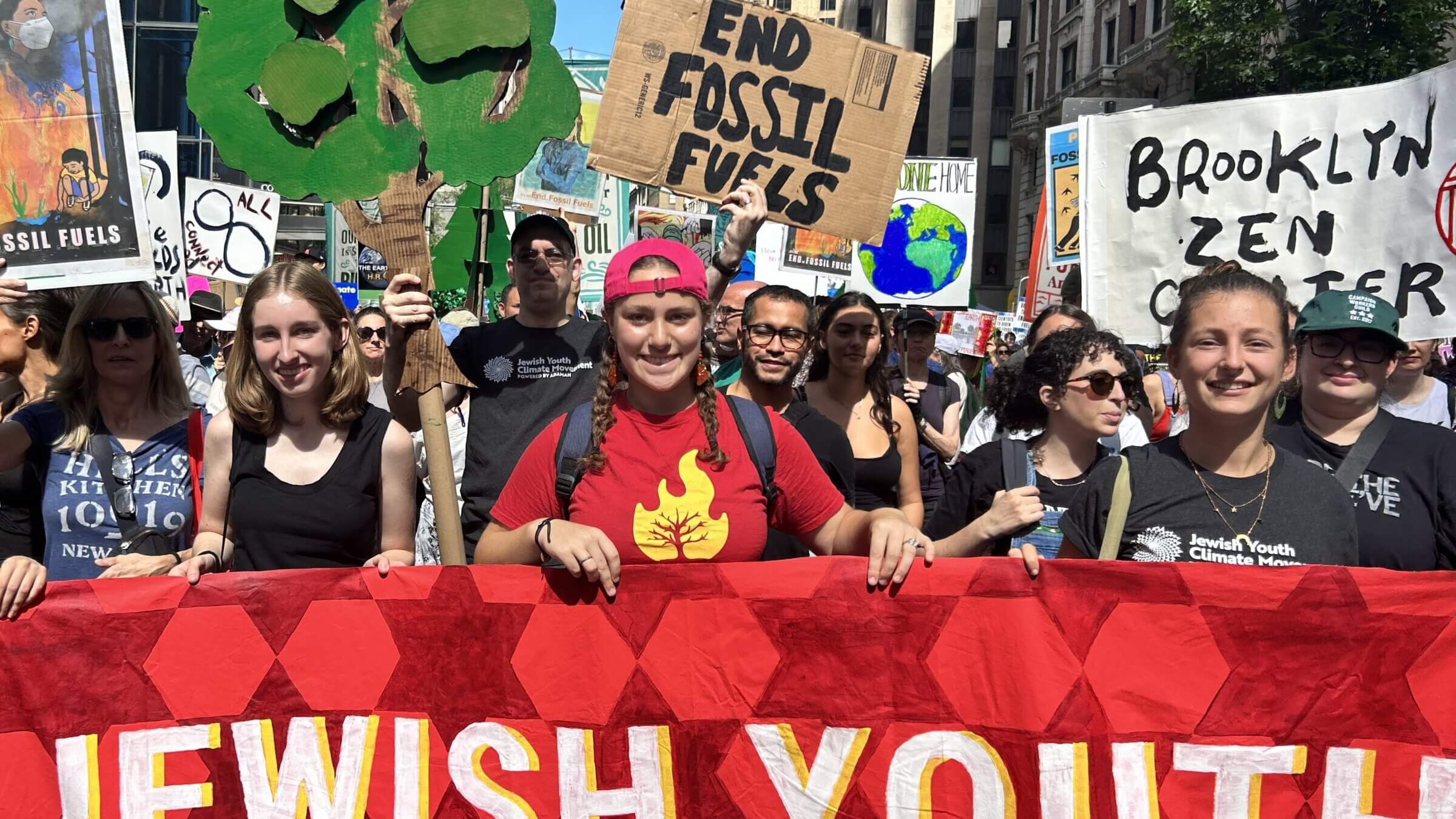This is a make or break election issue for young Jews
Climate change is on the ballot this Election Day

Leaders from the Jewish Youth Climate Movement join the March to End Fossil Fuels in New York City in Sept. 2023 as part of NY Climate Week Courtesy of Jewish Youth Climate Movement
Jewish organizations and leaders staunchly defend Gen Z when it comes to antisemitism. But when it comes to our well-being amid the climate crisis, those of us too young to vote are concerned by both a Jewish and national electorate that seems to have left climate somewhat by the wayside.
In June 2023, five months before the Oct. 7 attacks on Israel, a poll conducted by the Jewish Electorate Institute showed that among voting issue priorities for American Jews, climate change ranked fourth and Israel 10th. In the Institute’s April 2024 poll, climate change was ranked seventh, surpassed by Israel in fourth, immigration in fifth, and national security and foreign policy in sixth. This trend is visible beyond Jews: in a September poll by the Pew Research Center, climate ranked lowest on a list of issue priorities for surveyed Americans this cycle.
As a young Jew, I find this trend troubling, for the safety of both the planet and Jewish communities. Caring less about climate change especially harms teens, who face the most dire consequences if we fail to curb global emissions.
While climate has fallen as an issue of concern for voters since 2023, multiple polls suggest that the number one issue for Jewish voters in 2024 is the future of democracy. Young Jews know that protecting democracy is inextricably linked to climate action. Climate change destabilizes not just the physical environment that young people are inheriting, but also our democratic processes. In the short term, free and secure elections are increasingly encumbered by flooding, fires, extreme heat, and more. In the long term, climate change will instigate conflicts over resources, forcing people to flee conflict zones and potentially stirring up anti-immigrant backlash that can thrust anti-democratic governments into power.
Jews themselves have experienced the effects of climate change firsthand. Jewish populations in Florida and California have been hit hard by climate catastrophes like hurricanes and wildfires. Alongside New York and New Jersey, which have experienced heat waves exacerbated by climate change, the communities in these four states comprise the majority of the American Jewish electorate.
Swing states such as Arizona, Pennsylvania, and Michigan also have sizable Jewish communities, whose voters may play a critical role in the outcome of the presidential election.
So this election provides an opportunity for American Jews to help ensure the safety and well-being of their communities by voting for candidates who prioritize climate solutions. At a time when the federal government has begun to truly invest in clean energy, but the Supreme Court has also released pro-fossil fuel rulings, this election is a crucial chance for American Jews to see that the future of both their physical environment and their democratic structures is tied up with U.S. climate policy.
Jews must loudly and proudly declare that, for the sake of Jewish youth, they are voting for the future of democracy and climate in tandem because the political structure Jews hold most dear flourishes best in a liveable climate. Jewish voters must use their power in this year’s election to demand climate action, no matter the candidate. This is not only better for the world but also necessary for the stability of Jewish communal life — and for the young people who cannot yet cast votes for our futures.
A message from our Publisher & CEO Rachel Fishman Feddersen

I hope you appreciated this article. Before you go, I’d like to ask you to please support the Forward’s award-winning, nonprofit journalism so that we can be prepared for whatever news 2025 brings.
At a time when other newsrooms are closing or cutting back, the Forward has removed its paywall and invested additional resources to report on the ground from Israel and around the U.S. on the impact of the war, rising antisemitism and polarized discourse.
Readers like you make it all possible. Support our work by becoming a Forward Member and connect with our journalism and your community.
— Rachel Fishman Feddersen, Publisher and CEO




























